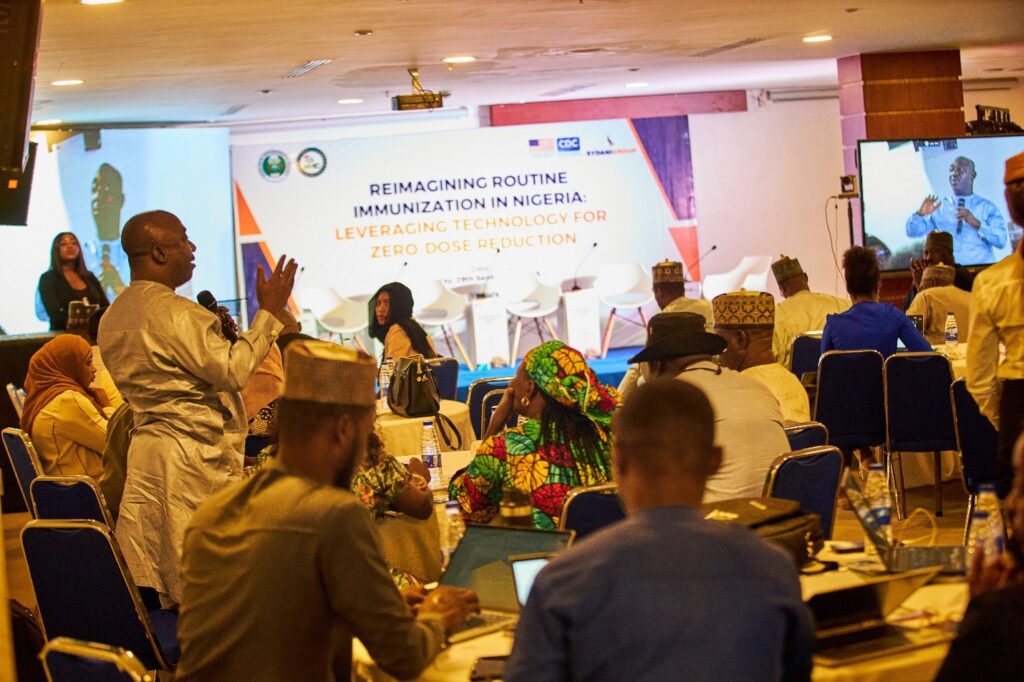Reimagining Routine Immunization in Nigeria: A National Learning Moment – Collaboration and Innovation at the Heart of Immunization
On Monday, September 29, 2025, government leaders, development partners, and public health experts from across Nigeria gathered in Abuja for a transformative national learning event themed “Reimagining Routine Immunization in Nigeria: Leveraging Technology for Zero-Dose Reduction”, and organized by the STRICAN (Strengthening Routine Immunization in Consequential Geographies of Niger State) team of Sydani group.
The event, hosted by the Niger State Government of Nigeria through the Ministry of Primary Health Care, in collaboration with the United States Diplomatic Mission in Nigeria, the U.S. Centers for Disease Control and Prevention (US-CDC), and Sydani Group, created a unique platform for shared learning, reflection, and innovation.

The convening came at a critical time for Nigeria’s immunization landscape. As the country continues to drive toward achieving universal immunization coverage, reducing the number of zero-dose children (i.e. children who have never received any routine vaccine) has become a national priority. With millions of children still unreached, the learning event provided an avenue to spotlight progress, share state-level innovations, and discuss how digital solutions are reshaping access and accountability in immunization delivery. The learning program brought together participants from federal and state governments, implementing partners, health workers, and digital innovators. Representatives from the immunization programs in Niger, Kano, Katsina, Jigawa, and Zamfara States were present to share experiences, celebrate milestones, and exchange lessons.
Opening remarks from Sydani group highlighted the importance of collaboration in sustaining immunization gains. The Niger State Commissioner for Primary Health Care reaffirmed the government’s commitment to innovative solutions, emphasizing that “technology must not only serve as a tool for efficiency but as an enabler for equity”, ensuring that no child is left behind. From the U.S. CDC came a strong message of partnership and sustainability, recognizing that Nigeria’s progress in immunization is increasingly dependent on its ability to build resilient, technology-driven systems. Sydani Group’s leadership echoed this sentiment, highlighting the organization’s role in leveraging data, analytics, and local capacity to strengthen health systems and accelerate zero-dose reduction.

The event’s agenda unfolded through a series of engaging sessions designed to foster deep reflection and practical exchange. The identify-Enumerate-Vaccinate (IEV) strategy was utilized to reduce the burden of zero-dose children in selected communities of Niger state. A documentary showcased real-life stories from communities where an innovative tool developed by Sydani group (Micro-coverage Tracking Tool [MCTT]) have improved vaccine delivery and accountability. The participants then further explored insights from the MCTT platform – a data-driven tool that tracks coverage gaps and helps policymakers make informed, targeted decisions.
There were interactive sessions in the program which allowed states to present how digital platforms have enhanced data visibility and coordination for routine immunization and immunization campaigns. For instance, officials from Niger State shared their experience in using geo-coded health facility dashboards to monitor immunization campaign activities, while other states discussed how community-based reporting tools have strengthened outreach to remote settlements. Each presentation reinforced the central theme: innovation works best when grounded in local ownership and continuous learning.
One of the most impactful elements of the day was the sense of shared purpose. Despite varying geographical contexts, states identified similar challenges; data quality, logistics, and workforce capacity, and similar opportunities for technology to bridge these gaps. This spirit of openness and collaboration transformed the event from a conventional meeting into a genuine learning exchange.
The STRICAN learning event showed how far Nigeria has come in adopting technology to strengthen routine immunization – and how much potential remains untapped. Digital systems are helping states monitor routine immunization and track children missed by immunization campaigns, monitor vaccine stock levels, and improve data reliability. But beyond the technology itself, what emerged was a renewed commitment to using digital innovation as a driver of accountability, transparency, and equity. As one participant observed, “Technology is not replacing people, it’s empowering them. Our challenge is to ensure that every innovation reaches the last mile.” This insight captured the ethos of the event: that sustainable progress requires the right balance between technological advancement and human-centered delivery.
By the close of the event, participants left with a unified vision: to reimagine routine immunization in Nigeria through innovation, data-driven decision-making, and collaborative learning. The lessons shared from across states reinforced the belief that while challenges persist, the path to achieving zero-dose reduction is clearer than ever when guided by evidence and partnership.
This national learning moment in Abuja demonstrated that progress in immunization does not happen in isolation. It thrives through dialogue, shared ownership, and continuous adaptation. The event’s outcomes will serve as a stepping stone for future engagements, inspiring continued collaboration among states, partners, and communities.


As Nigeria accelerates its journey toward zero-dose elimination, the message from the learning event in Abuja is clear: technology, when combined with strong leadership and local innovation, can transform immunization delivery and secure a healthier future for every Nigerian child.

